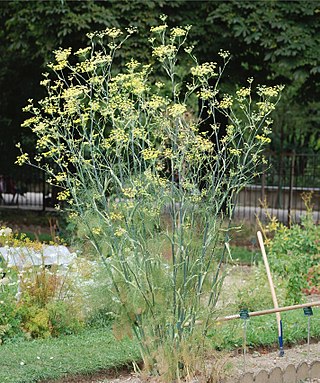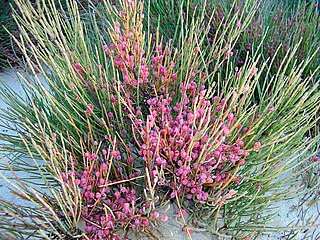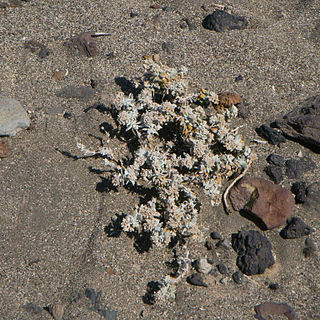
Foeniculum is a genus of flowering plants in the carrot family. It includes the commonly cultivated fennel, Foeniculum vulgare.

Fourmies is a commune in the Nord department in northern France. The inhabitants are called Fourmisiens. It lies on the river Helpe Mineure. Since 2015, Fourmies has been the seat of the Canton of Fourmies, an administrative division of the Nord department. The canton was created at the French canton reorganization which came into effect in March 2015.

Pancratium maritimum, or sea daffodil, is a species of bulbous plant native to both sides of the Mediterranean region and Black Sea from Portugal, Morocco and the Canary Islands east to Turkey, Syria, Israel and the Caucasus. In the parts of its range on the south Bulgarian and north Turkish and Georgian coasts of Black Sea. It is also naturalized in southern California, Bermuda and the Azores.

René Charles Joseph Ernest Maire was a French botanist and mycologist. His major work was the Flore de l'Afrique du Nord in 16 volumes published posthumously in 1953. He collected plants from Algeria, Morocco, France, and Mali for the herbarium of the National Botanic Garden of Belgium. and issued two exsiccatae.

Ephedra altissima is a species of Ephedra that is native to the western Sahara, and also to the Canary Islands.

Ephedra fragilis, commonly named the joint pine, is a species of Ephedra that is native to the western Mediterranean region of southern Europe and Northern Africa, and from Madeira and the Canary Islands in the Atlantic.

Asphodeline is a genus of perennial plants in the family Asphodelaceae, first described as a genus in 1830. It is native to the eastern Mediterranean region and the Middle East from Italy and Algeria east to Iran.
Ighermia was a monotypic genus of flowering plants in the daisy family. It had only one species, Ighermia pinifolia(Maire & Wilczek) It was first published in Nordic J. Bot. Vol.3 on page 445 in 1983.

Svante Samuel Murbeck was a Swedish professor, botanist, pteridologist and explorer.

Allium rotundum, common name round-headed leek or purple-flowered garlic, is a Eurasian and North African species of wild onion. Its native range extends from Spain and Morocco to Iran and European Russia. It is sparingly naturalized in parts of the United States. The species grows in disturbed habitats such as roadsides, cultivated fields, etc.

Allium chamaemoly, called dwarf garlic, is a species of garlic native to the Mediterranean region and cultivated elsewhere for its pretty flowers and potently aromatic bulbs. It is found in the wild in Spain, France, Malta, Italy, Greece, the Balkans, Algeria, and Morocco.
Allium commutatum is a species of Mediterranean onions in the amaryllis family. Its native range extends from Corsica and Algeria to Turkey. It has also been introduced to northern Argentina.

Allium subvillosum, the spring garlic, is a European and North African species of wild onion native to southern Iberia, the Balearic Islands, Sicily, northern Africa and the Azores where it might be introduced.
Allium tenuiflorum is a Mediterranean species of wild onion found in Algeria, Morocco, Libya, Italy including Sardinia, and the Balkans.
Hannonia is a genus of plants in the Amaryllis family. It contains only one known species, Hannonia hesperidum, endemic to Morocco and confined to Western Morocco, Promontory of Hercules. The specific epithet comes from Greek έσπερος, of evening, as the flowers open in the late afternoon.

Saccocalyx is a genus of flowering plant in the family Lamiaceae, first described in 1835. It contains only one known species, Saccocalyx saturejoides, native to Morocco and Algeria.
Allium litardierei is a North African species of wild onion native to Algeria and Morocco.
Georges Jean Louis Malençon was a French mycologist known for his investigations of fungi native to North Africa and the Iberian Peninsula.

Polycarpaea nivea is a species of flowering plants in the family Caryophyllaceae. The species was described by William Aiton in 1828 as Achyranthes nivea, and it was placed in the genus Polycarpaea by Philip Barker Webb in 1849. The specific name nivea is Latin for "white as snow", and refers to the colour of the plant.

Aquilegia cossoniana is a perennial flowering plant in the family Ranunculaceae, native to the Atlas Mountains in northwestern Africa.














